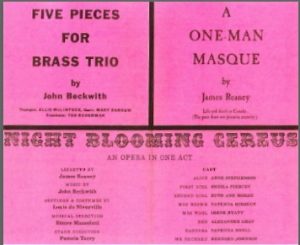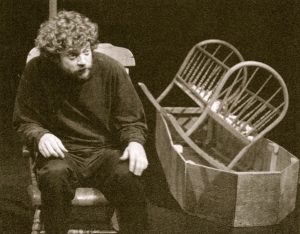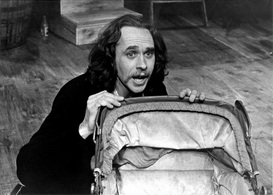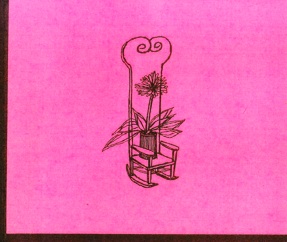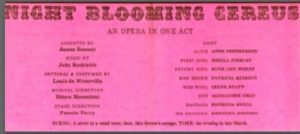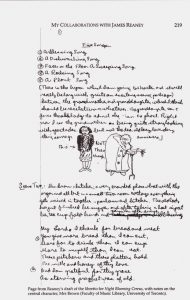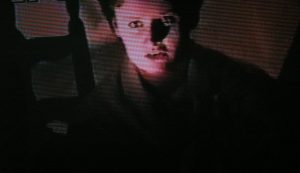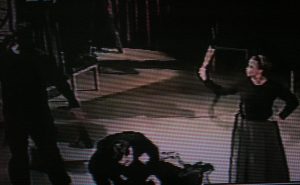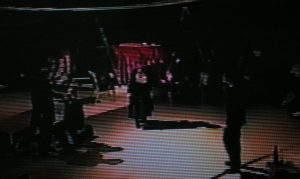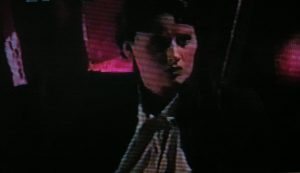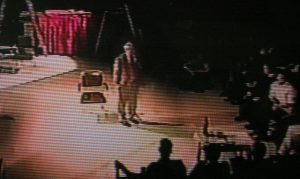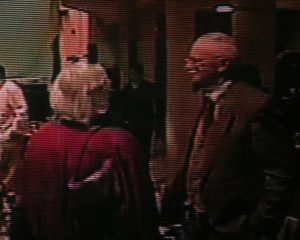In this excerpt from James Reaney’s play Gyroscope, Gregory La Selva, lab technician, seeks to restore his self-esteem and win back the love of his wife, Hilda, a famous poet. To win Hilda’s respect, he must prove to her that he too can write poetry. He enlists the help of Mattie Medal, PhD student, to help him write a poem that will win him a place at the Harpers’ Poetry Guild alongside Hilda.
Scene Six: The Husband Takes a Chance on Being Skinned by Apollo*
PUZZLE gets down from the chair. We focus on MATTIE, with wagon, who is talking to GREG.
GREG: Look, is there some sort of crash course in writing poetry? I’d like to crack that bunch of Harp Guild Workshop Poetry ladies wide open.
MATTIE: You’re a man; the contest is open to women only.
GREG: I’m desperate enough for a sex-change operation.
MATTIE: You’re just jealous of your wife.
GREG: I’m even more ashamed of my sterility. I have no dreams. She is virile. I am not.
HILDA: Gregory La Selva couldn’t write a poem if he tried. He should stick to being a poem.
GREG: She’ll be sorry she said that. I’m going to do as you say and start remembering things from childhood, keep a diary, get a pen and an ink bottle.
MATTIE: A typewriter is okay.
GREG: I’m so dull, why hasn’t she left me ages ago? How do I get more introverted? Is there anything I could take?
NICHOLAS: Did you look at my scrapbook of intoxicating mushrooms?
GREG: Nicholas, it’s no use — showing me pictures of mushrooms. I want to see the mushrooms in person before I start collecting.
NICHOLAS: Opium.
GREG: Opium.
MATTIE: Awfully good at first — friend did a thesis on it about it. Your mind starts out being a palace; then… the palace turns into a boarding house, then a flophouse for tramps, then the tenements of criminals whose windows are striped with bars. The palace has turned into a prison.
GREG: I don’t care. Show me the palace, Nicholas, get me a dress.
NICHOLAS: What’s your size?
GREG: In a dress? (gives NICHOLAS a slip of paper)
MATTIE: For a start, Mr. La Selva, underline the words you really like in this forty-thousand-word dictionary. Nicholas, go to Agnes Dactyl’s place and see what she has in second-hand dresses. Let’s see these measurements. Very well.
She gives them to NICHOLAS, who slowly proceeds to AGNES’s store.
Oh boy, this is a new part of my thesis – the birth of a poet…
∞♥∞♥∞
*Note: “Being skinned by Apollo” is a reference to the fate of Marsyas, the satyr who challenges Apollo to a musical contest with the Muses as judges. In 1963 James Reaney wrote an adaptation of Euripides’ play The Bacchae (405 BCE), which was never produced. In Gyroscope, Gregory La Selva disguises himself as a woman to enter Hilda’s poetry contest, just as Pentheus goes dressed as a woman to spy on the Bacchae’s Dionysian rites. Gregory wins the poetry contest and avoids the gruesome fate of Pentheus at the hands of the Bacchae.
Gyroscope was produced in a workshop at Western University in early 1980, and performed in a rehearsed reading at Blue Mountain Poetry Festival that summer. Keith Turnbull later directed the play at Tarragon Theatre in Toronto, May 14 to June 21, 1981. The cast members were Jerry Franken, Janis Nickleson, Rita Jiminez, Brian Dooley, and Nancy Palk.
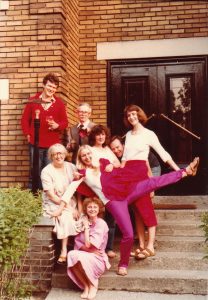
Gyroscope is available in Reaney Days in the West Room: Plays of James Reaney (2009), edited by David Ferry and published by Playwrights Canada Press.

